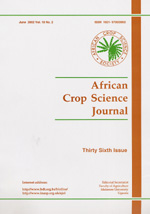
|
African Crop Science Journal
African Crop Science Society
ISSN: 1021-9730
EISSN: 1021-9730
Vol. 7, No. 4, 1999, pp. 415-422
|
 Bioline Code: cs99032
Bioline Code: cs99032
Full paper language: English
Document type: Research Article
Document available free of charge
|
|
|
African Crop Science Journal, Vol. 7, No. 4, 1999, pp. 415-422
| en |
Soil Fertility Studies with Compost and Igneous Phosphate Rock Amendments in Malawi
Nyirongo, J.C.V.B.; Mughogho, S.K. & Kumwenda, J.D.T.
Abstract
Oxide mineralogy of acid tropical soils contributes to the problem of phosphorus (P) deficiency due to P sorption. The objectives of this research were to evaluate composting methods for improving the availability of phosphorus in igneous low grade (low reactivity) Tundulu phosphate rock and to test their effect on maize (Zea mays L.) yield. The treatments included two composting materials (cattle manure and maize stover) which were applied at 3 t ha-1. Phosphate rock, was composted at three levels: 50, 75 and 100 kg P2O5 ha-1. Epigeic earthworms were introduced into phospho-composts of manure. Sole manure and crop residue composts were also prepared. Three levels of phosphorus were also applied as direct application of phosphate rock. Single super phosphate (SSP) was used as a standard treatment at the rate of 20 kg P2O5 ha-1. There were 16 treatments in total. The experiment was arranged as a Randomised Complete Block with 3 replications. Soil analysis for P has shown no significant differences among treatments in improving the status of P in the soil at both Lunyangwa and Bembeke experimental sites both at seedling and harvest stages of maize, and among sampling times during the first season (1997/98). All P values were below the critical value for P in the soil and therefore maize yield realised was far below the potential for all the treatments.
Keywords
Earthworms, fortified compost, P deficiency, soil acidity, Tundulu rock phosphate
|
| |
| fr |
Nyirongo, J.C.V.B.; Mughogho, S.K. & Kumwenda, J.D.T.
Résumé
La mineralogie des oxides de sols tropicaux contribue au problème de déficience du P due à sa fixation. Les objectives de cette recherche étaient d’évaluer les méthodes de compostage pour améliorer la disponibilité du phosphore dans l’indigène roche phosphatée de Tundulu à faible réactivité et de tester son effect sur le rendement du maïs (Zea mays L.). Les traitements comprenaient deux materiels de compostage (fumure de vache et les résidus du maïs) étaient applîqués à un taux de 3 tones ha-1. La roche phosphatée, qui était compostée était à trois niveaux: 50, 75 et 100 kg P2O5 ha-1. Les verres de terre étaient incorporées dans 3 additionnelles fumures de composte de phosphore. Seule la fumure et les compostes de résidus de culture ont été préparés. Trois niveaus de phosphore ont été aussi appliqués comme une application directe de la roche phosphatée. Le superphosphate simple (SSP) a été utilisée comme un traitement standard à un taux de 20 kg P2O5 ha-1. Les traitements étaient 16 au total. L’essai était conduit dans un bloc complètement randomisé. L’analysis du sol pour le P a montré qu’il n’y avait pas de difference significative entre traitements dans l’amélioration de la situation du P dans le sol des sites experimentaux de Lunyangwa et Bembeke à la germination et au stade de recolte du maïs, et entre les périodes d’echantillonnage pendant la première saison (1997/98). Toutes les valeurs du P étaient en dessous de la valeur critique du P dans le sol et ainsi le rendement du maïs obtenu était beaucoup inférieur au rendement potentiel pour tous les traitements.
Mots Clés
Verre deterre, compost fortifié, Malawi, déficience en P, acidité du sol, phosphate de Tundulu
|
| |
© Copyright 1999 - African Crop Science Society
|
|
